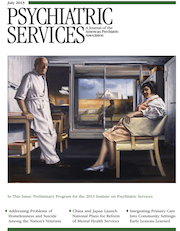Homelessness and Premature Mortality Among Veterans
Since the wars in Iraq and Afghanistan began, the U.S. Department of Veterans Affairs (VA) has emerged as a significant and highly visible provider of mental health services. This issue includes several contributions from VA researchers. Two are related to homelessness among veterans and another to the effects of VA’s ongoing mental health enhancements on suicide rates among veterans. Analyses of mortality data presented in the Datapoints column show that among veterans with a diagnosis of severe mental illness, homelessness was a stronger contributor than diagnosis to years of potential life lost. A letter to the editor reports that among veterans who die from suicide, homeless veterans die at younger ages than other veterans. Together, the two contributions suggest that enrollment in a health system and receipt of homelessness services are not sufficient to address the problem of homelessness. It may take specific services.
Recognizing the problem, VA has implemented a campaign to end homelessness among veterans that includes a number of important programs. In one such program, VA partnered with the U.S. Department of Housing and Urban Development (HUD) to implement a housing first strategy—HUD-VA Supported Housing (HUD-VASH)—that prioritizes access to permanent housing through HUD vouchers and then adds VA case management and other services to help veterans achieve housing stability and recovery. Recently, VA extended HUD-VASH to address the needs of veterans and families at imminent risk of homelessness, in addition to those who are currently homeless. In another program, VA is developing specialized medical homes for homeless veterans that integrate general medical, mental health, and substance abuse treatment and other supportive services. It may take the combination of permanent housing and a comprehensive medical home to address homelessness.
Together, outcomes such as homelessness and suicide—and other forms of premature death among veterans—may be among the most severe effects of war for America’s veterans. As the wars in Afghanistan and Iraq come to an end and their histories are written, the communications in this issue of Psychiatric Services must be viewed as an early part of the story. As the history unfolds, the wars may leave a legacy of extensive illnesses and injuries. However, there is another possibility. If VA’s programs for homeless veterans and its mental health enhancements prove to be effective, the histories that are written may speak of the war as a catalyst for advances in mental health care for veterans and, by extension, for the nation as a whole. Time and a continued focus on mental health services, program evaluation, and health services research will tell.



